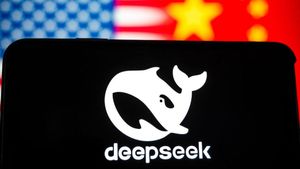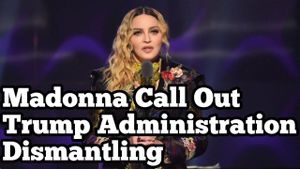Concerns about free speech and increasing censorship are drawing attention from across the globe, especially as nations and states navigate their legal boundaries surrounding expression. With examples sprouting everywhere, from the United Kingdom to the United States, the question of where the line is drawn between protecting societal norms and infringing upon individual rights is becoming more contentious.
Recent incidents reveal how deeply ingrained this issue has become. Julie Burchill from The New York Sun highlights alarming instances where police have arrested individuals for social media posts deemed inappropriate or offensive, showcasing what she calls the ‘selective censorship’ of free speech.
The British police are now taking action against expressions they label as ‘hate speech,’ arguing these measures are necessary to public safety. This shift has sparked frustration, especially since crime-solving rates have been stagnant—many believe these efforts are misdirected, focusing on mundane expressions rather than serious criminal activities.
Meanwhile, Burchill recalls the chilling tales of common people facing charges for seemingly frivolous infractions. A man was prosecuted for calling a police horse “gay,” painting a picture of overzealous political correctness and public sentiment turning against casual discourse.
Across the pond, U.S. political discourse shows signs of similar strain. Minnesota Governor Tim Walz stirred controversy with remarks implying limitations on free speech surrounding ‘misinformation’ and ‘hate speech,’ which many critics argue are directly contrary to the broad protections guaranteed by the First Amendment.
Walz's comments reflect a growing discomfort among some policymakers about unregulated speech. It begs the question of whether these attempts at regulating what individuals can say, especially by those running for office, signal the beginnings of more comprehensive censorship.
Yet, this isn't solely confined to legal perspectives. Many commentators suggest there’s a societal shift underway, whereby individuals are becoming increasingly comfortable with the idea of limiting speech they find distasteful. Such sentiments echo through the Freedom Forum, which warns about the substantial portion of the population prioritizing restrictions on 'hate speech' over traditional free expression rights.
Simultaneously, coordinated efforts from both sides of the political spectrum have resulted in growing support for regulatory efforts aimed at stifling certain expressions. This tightening grip on free speech has created discomfort for many, especially those within the cultural sphere, like comedians and public figures who thrive on satire and provocative commentary.
Alan Terr, the public policy director at the Foundation for Individual Rights and Expression, argues for the preservation of these freedoms, especially concerning political satire. “The First Amendment safeguards satire and parody, which are intrinsic to American political culture,” he asserts, indicating the potential dangers posed by excess scrutiny.
Recent confrontations surrounding the legality of satire showcase what is at stake. A notable case involves Elon Musk, who recently retweeted a satirical video poking fun at political figures, igniting calls from California’s Governor Gavin Newsom for legislative measures against manipulation and parody—a clear illustration of tensions surrounding humor and free expression.
The impact of social media platforms is also significant. Tools like X (formerly Twitter), which is pivotal for public discourse, could either champion or hamper expressions based on the prevailing social sentiments dictated by the platforms’ respective leadership.
Authorities in the United Kingdom have taken their stance one step farther, issuing warnings against online content collectively regarded as dangerous. For example, the Crown Prosecution Service recently urged social media users to reconsider their posts by asserting, “Content inciting violence or hatred isn’t just harmful—it can be illegal.”
The ripple effects aren't limited to minor offenses but extend to prominent figures, as seen with J.K. Rowling and Elon Musk embroiled in legal disputes born from social media dialogues. The scrutiny faced by these figures raises alarms about the future of both celebrity discourse and everyday free expression.
Despite the unregulated environment, groups such as The Babylon Bee, which employs satire, find themselves increasingly under the microscope. Their leader, Seth Dillon, has been vocal about concerns surrounding laws facilitating stifling expressions deemed offensive, potentially harming the whole marketplace of ideas.
He articulated fears surrounding state control over speech, stressing, “The law mandates platforms to publish definitions of hate speech and establish reporting mechanisms, which can chill discourse.” The ramifications of these policies can be extensive, encouraging individuals to self-censor or avoid discussions altogether for fear of unexpected repercussions.
Regrettably, humor and satire have not remained immune to the effects of such censorship. Dillon recalled past instances—the suspension of The Babylon Bee for humorous yet controversial headlines—illustratively depicting the risks faced by satirical platforms today.
Even established norms are challenging as conversations around “offensive” content grow. Salman Rushdie, who faced life-threatening consequences for his views, emphasized the importance of protecting satirical arts which serve as formidable tools against tyranny, stating, “Defending the art of satire is integral to combating oppression.”
The examples are countless and show both the tension between individual liberties and collective sentiment. Though many may view offensive speech as undesirable, allowing the government to shape our speech norms could lead to insidious consequences.
With the societal willingness to redefine acceptable speech, images of what constitutes free expression are rapidly transforming. Polls reveal over 40% of respondents now view preventing hate speech as more imperative than safeguarding free speech—a worrying trend for advocates of the First Amendment.
Understanding this precarious balance becomes increasingly important as boundaries of acceptable expression continue to shift. The difference between satirical commentary and outright misinformation often blurs, potentially placing increased scrutiny on individuals merely exercising their right to free speech.
Delving deep reveals stakeholders from politicians to everyday citizens; the universal quest for balance between offense and freedom leaves many pondering how far society is willing to go. Where do we draw the line between protecting one another and stifling expressions?
The challenges these conflicts present reflect broader societal battles over personal autonomy and the collective response to speech deemed harmful. This dialogue, teeming with complexity, merits attention—not only for those directly involved but for all invested in the values of free expression.
Going forward, the focus must shift to fostering dialogue ensuring every voice can be heard without repercussions—an ideal laden with difficulties, yet foundational to democratic society. It remains to be seen whether free speech will triumph, or succumb to rising tides of censorship threatening its essence.



